The world is an ever evolving wonder, and what one man sees joy and equality in, another man might find corruption and bitterness. Such is the problem with different points of view, our beliefs, faiths and ideals are constantly being tested and evolve along with the world through one reason or another. This is what makes politics such a touchy subject.
Politicians were created to represent the people, to offer a voice for the voiceless, and to make sure that the government remains an institution that was created by the people and for the people. Yet, overtime, this message has gotten a bit muddled and foggy, and replaced by something else - power. To be able to hold a position where one is respected, noticed and has control over how their country will run.
Their journey becomes less about providing the people with a world with freedom and liberty, and more about maintaining that seat of power and control. They're forced to leave their personalities, opinions and beliefs at the front door, when those are exactly what got them in this position in the first place.
They are politicians first, and decent human beings later.
This is the timeless political message of Frank Capra's 1939 classic "Mr. Smith Goes To Washington." Without ever losing a hint of charm, class or its child-like sense of humor, Capra is able to delve into just how much America has changed since our fore-fathers signed the Declaration Of Independence, while making it look so simple that it like a Shakespeare play set in the Senate.
After an elder senator of a western state passes away, the Senate must scramble to find a replacement before the next meeting, where a massive bill to build a dam in that state is to be passed. When bribery and pleading with the people fails, the governor selects someone who the people love, but has no political experience - Jefferson Smith (James Stewart). Smith is just happy to be in the heart of the nation's capital, let alone be apart of the Senate, admitting that even he does not belong there. But after Smith begins to work on a bill of his own, with the help of his assistant, Ms. Saunders (Jean Arthur), he begins to uncover a political scandal involving his fellow state senator (Claude Rains) and Jim Taylor (Edward Arnold), a man who seems to have his hands involved in everything in their state.
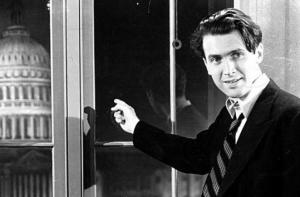
Let's start with what I love the most about this film - James Stewart and the character of Jefferson Smith. There is going to be a bit of Jimmy Stewart in this countdown, so get use to me saying this, but Stewart can do no wrong as an actor. Stewart never oversells anything, and puts all of his emotions, struggles, weaknesses and strengths on the table, for everyone to admire. Most actors get lost in their performance and forget that they are playing to an audience, but not Jimmy. We share his triumphs, rage with him when he gets angry and want to embrace him during his bitter defeats.
I would go as far to say that Jimmy Stewart's performance in "Mr. Smith Goes To Washington" just might be his finest, or at least the most fun to watch. His wide-eyed happiness as he arrives in Washington D.C. to find the Capital Dome, and immediately dropping everything to go sight-seeing is both strange and heart-warming to see. A man who receives so much bliss from witnessing monuments that he has seen probably a thousand times in books and magazines.
This is a man who is worth watching.
Jefferson Smith is an idealistic individual, who seeks out the "lost causes" and can recite George Washington, Thomas Jefferson and Abraham Lincoln quotes. He even goes as far as to go through the majority of the American history on a train ride to Washington D.C., much to the dismay of his neighbors.
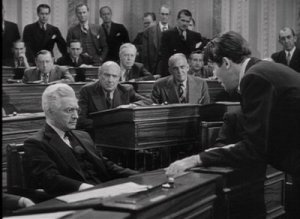
But this gives "Mr. Smith Goes To Washington" its bite - Nearly everyone in the film scoffs at Jefferson Smith for being so deeply enriched in American history and wants nothing more than to go sight-seeing, so that he may better understand America. These people think it is ridiculous that Smith is so fascinated by Washington and Jefferson - when they are the political descendants of Washington and Jefferson, and live in the town that they created.
Jefferson Smith is the modern-day equivalent of George Washington, and he is laughed at for being "idealistic."
But another point in this film is that America has greatly changed since our founding fathers passed on. We did not witness the creation of this country, we merely attempt to maintain the values that founded America. And one of the best ways to do that is through power and control - to be able to decide what is right and wrong, while checking out your ideals and beliefs at the front door.
We are merely told what "liberty" and "justice for all" is through our textbooks, but we do not take a step back to understand what those words truly mean.
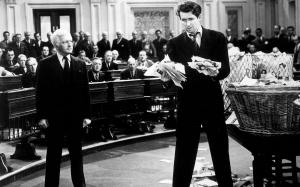
All of this is encapsulated in my second favorite aspect of "Mr. Smith Goes To Washington" - Claude Rains' character, Senator Joseph Paine. From what we're told, when he came to Washington, he was much like Smith, coming in with big dreams for his people, but could not get anywhere with his personal truths. So Paine was forced to make compromises and be told how to vote on certain bills by Jim Taylor, to gain political power and a foot-hold, which might have even resulted in a presidential nomination.
Paine sacrificed his ability to see those "lost causes" so that he could be apart of something bigger than himself. It is just too bad that he lost himself along the way.
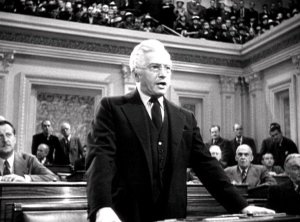
Like I said in the beginning, I do not like to discuss politics and as a result, there are very few political films that I enjoy. But this is one of the rare exceptions. "Mr. Smith Goes To Washington" is a blast to watch, due to excellent acting from everyone, with Jimmy Stewart and Claude Rains standing out above the others, a timeless political message about the evolution of politics, breath-taking cinematography of Washington D.C. that helps sell the impact of this city on Smith and that endearing Frank Capra charm that I love more every time I watch one of his films.
Capra knew just how to make a film that blends together comedy, tragedy, and undying love for other human beings that make up the heart of any classic. It is what made him one of the most intimate filmmakers of all time.
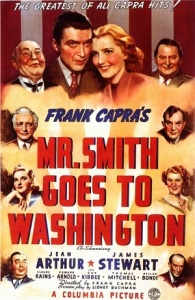

No comments:
Post a Comment